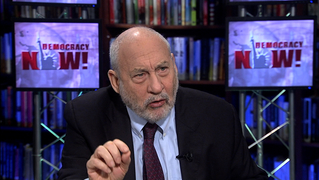
Topics
Guests
- Joseph StiglitzNobel Prize-winning economist, Columbia University professor and chief economist for the Roosevelt Institute. His new book is called Rewriting the Rules of the American Economy: An Agenda for Growth and Shared Prosperity.
Nobel Prize-winning economist and Columbia University professor Joseph Stiglitz warns about the dangers of the TPP, the Trans-Pacific Partnership. “We know we’re going to need regulations to restrict the emissions of carbon,” Stiglitz said. “But under these provisions, corporations can sue the government, including the American government, by the way, so it’s all the governments in the TPP can be sued for the loss of profits as a result of the regulations that restrict their ability to emit carbon emissions that lead to global warming.”
Transcript
AMY GOODMAN: Finally, Joseph Stiglitz, you just recently wrote a piece, “The Trans-Pacific Partnership Charade: TPP Isn’t about 'Free' Trade at All.” Explain.
JOSEPH STIGLITZ: Well, it was very much the point that was made in your segment that you had about Indonesia joining. The basic point is that this is a trade agreement that has all kinds of provisions intended to restrict regulations. We carved out one little piece—TPP carved out one little piece that was so, so outrageous that everybody was up in arms, and that was a provision about tobacco. On a provision very similar to this, Uruguay is being sued by Philip Morris, the successor to Philip Morris, because Uruguay passed a regulation, as did Australia, that on the package you have to say that this is bad for your health.
AMY GOODMAN: What we have in the United States.
JOSEPH STIGLITZ: Exactly. It’s a little bit more graphic, because they had the picture of what it did to your lungs. It worked. People started—you know, stopped smoking. Not everybody, but smoking was reduced. Under the provisions of this, TPP-like provision, Philip Morris can sue Uruguay for the loss of their expected profits as result of the regulation. In other words, the view is, they have the right to kill people, and if you want to take away that right, you have to pay them not to kill.
Now, we carved—that provision was carved out, but all the other areas were left in. So they were talking about climate change regulation. We know we’re going to need regulations to restrict the emissions of carbon. But under these provisions, corporations can sue the government, including the American government, by the way, so it’s all the governments in the TPP can be sued for the loss of profits as a result of the regulations that restrict their ability to emit carbon emissions that lead to global warming. If this provision had been in place when we had discovered that asbestos was bad for your health—you know, under the current provisions, asbestos manufacturers have to pay for the damage that they’re doing. They pay billions and billions of dollars. If the TPP had been in place, we would have to pay the asbestos manufacturers for not killing us. It’s outrageous.
AMY GOODMAN: We have to leave it there, but we’re going to continue the conversation right after the show and post it online at democracynow.org. Joseph Stiglitz, Nobel Prize-winning economist, Columbia University professor, chief economist for the Roosevelt Institute. His new book is called Rewriting the Rules of the American Economy: An Agenda for Growth and Shared Prosperity. Go to democracynow.org for Part 2.
WATCH MORE
Nobel Laureate Joseph Stiglitz on 'Rewriting the Rules of the American Economy'
Part 2: Joseph Stiglitz on Rewriting the Rules of the American Economy












Media Options